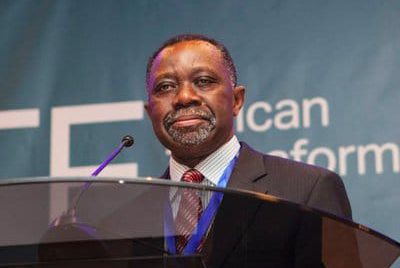The Founder and President of African Center for Economic Transformation (ACET), Dr. K. Y. Amoako has intimated that his outfit will engage political parties ahead of the upcoming general elections to incorporate the substantial matters that surfaced at the Citizen’s Convention in their manifestos in order to reflect the real struggles of citizens.
He was addressing the media after the closing ceremony of a 2-day convention, dubbed Ghana Compact Citizen’s Convention.
This year’s Ghana Compact Citizen’s Convention, held at the Cedi Conference Centre at the University of Ghana saw over 500 participants, some of which were representatives for various civil society organizations, political leaders, business gurus, students and government agencies, all in attendance for a rigorous consultative dialogue geared towards the way forward for Ghana.
In his interview, Dr. Amoako explained that the Citizen’s Convention is only the first phase of the national development process. The next phase, which is the implementation process, will ensure that the outcomes of the first phase will come to fruition to achieve national development, Dr. Amoako stated.
“This is the end of the first phase of a process that has taken two years, we’ve come here, created great ideas and discussions, we’ve come out with a declaration that spells out the aspirations and the hopes of Ghanaians with specific recommendations in Education, Health and Gender, Constitutional Reforms, social contracts and so on. The next phase is the implementation of all these recommendations so that all this work will be done and we need to hold people accountable for the results.”
“To make it happen, there are different facets of it; for example, ordinary citizens, particularly the youth. So, a lot of social media discussions are going to be taking place. We are going to engage political parties to make sure that their manifestoes focus on some of these key issues and when the next government comes into power, we want to make all these analysis and ideas available to them so that it can help them make good policies.”
Reflecting on the failure of policymakers to consider and implement some well-founded and strategic recommendations and ideas generated by experts, organizations, individuals and other stakeholders, Dr. Amoako expressed optimism over the in-depth engagements made with regular Ghanaians during the visitations to numerous regions in the country by his team.
He is hopeful that political leaders would not ignore the weight of their findings but rather consider them in good faith and subsequently proceed to the implementation of the proposed recommendations.
“I’m quite hopeful because this has been a different process, taking two years to get here, the amount of effort that went into the analyses, the consultations, the fact that we’ve been to eight (8) regions, you can’t ignore that so I’m very hopeful that we will be able to maintain the momentum and to get governments understand that we all need to do this for the future of this country, I’m hopeful. Some political leaders were here and they’ve listened, we engaged them and we are going to continue to engage them so I’m hopeful.”
–
Story by: Esther Esenam Ofori | univers.ug.edu.gh

